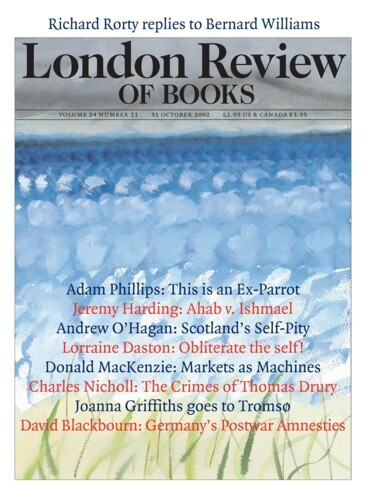In your average bookstore, the volumes stacked by the dozen and sold under the heading of Self-Help are liable to be found quartered in the same part of the building as those falling under the less obviously improving rubric of Philosophy. It’s a little hard to see why, in the present age, when Philosophy has wrapped its professionalism aloofly around it and sneaked off down the corridor into the seminar room, casting sufficient doubt as it retreats from view on the mere existence of a self to make the notion of Self-Help seem at best paradoxical and at worst inconceivable. Long gone are the days when, as we veterans of London’s public transport fondly misremember, there was invariably someone on the upper deck of the 38 bus who was patently having a ball en route for the office with The Critique of Pure Reason.
But if Philosophy has pretty much died out as an element in public life in our own epistemologically challenged country, it has hung on in France, and been boosted there indeed by the recent innovation of the café-philo, or aspiring pedestrian layby where democratically inclined philosophers can drop in to argue great or small existential issues with such flâneurs as fancy making intellectual capital out of their morning caffeine rush. This is quite an advance in the direction of mass philosophical participation when the nearest you could expect to get to something like it in the past would have been a chance sighting of Jean-Paul Sartre adding to an already intimidating scatter of manuscript pages while sitting in the spring sunshine outside the Deux Magots. But then France has the baccalauréat, and the inescapable philosophy paper that forms part of it, so it’s a fair assumption that there won’t be any problem in raising a quorum among passers-by keen and forearmed for wayside philosophical talk-ins.
And for further evidence that professional philosophers in France are ready these days to come down to street level and mix with the more thoughtful class of citizen, there’s now the English translation of a very successful book published in Paris last year: 101 Experiments in the Philosophy of Everyday Life (Faber, £12.99). The author, Roger-Pol Droit, is an academic who’s had a regular spot in Le Monde in which to philosophise for the past thirty years. He calls the book an ‘entertainment’, being an attempt to induce in whoever reads it – that’s to say, whoever reads it in the right perlocutionary spirit and goes on actually to try the experiments proposed – ‘that astonishment which gives rise to philosophy’. The idea is to get people to do 101 trivial things whose common aim is to make the world appear much odder than we daily sense it to be: both its objects, and the words we use to talk about them, and our own activities, along with the first-person pronoun we complacently suppose to be the agent conducting them.
The format is, you might say, Delia Smith for eggheads: each experiment is topped, as though it were a kitchen recipe, by its ‘duration’, which can be anything from ‘instantaneous’, when you ‘rediscover a childhood scene that seemed larger’, up to the ‘few years’ it apparently takes to ‘get used to eating something you don’t like’; ‘props’, frequently ‘none’ and never very many or hard to get hold of; and ‘effect’, which can be ‘pitiless’, as when you’re asked to ‘visualise a pile of human organs’, ‘dyspeptic’, when the experiment is one in overeating, or ‘canine’ when you ‘believe in the existence of a smell’. Try all 101 of the attitudinal reforms thus imaginatively programmed and your life will no doubt be altogether richer than the unthinking exercise in somnambulism it was – it’s hard not to cast the mind back when reading Droit to the time when Zen was the thing and nonsensical questions got bandied about in a short-lived attempt to unsettle our ways of thinking.
Since some at least of the 101 experiments have to be done in public places, one good test of the book’s effectiveness will be to keep an eye on, for example, any suitably capacious cemetery, to establish the total of those committed to Experiment 24, ‘run in a graveyard’ (promised effect, ‘pious’). Short Cuts has so far attempted only one experiment, No 32: ‘resist tiredness’, duration ‘variable’, props ‘none’, effect ‘subtle’. The result was not to demonstrate, as scoffers will automatically suppose, that tiredness is what we always knew it was, i.e. irresistible, but that when you’re engaged on a life-enhancing experiment of this kind you tend to find your attention fixed – to none too subtle effect – on the self (if any)-defeating fact that you’re engaged on a life-enhancing experiment.
Send Letters To:
The Editor
London Review of Books,
28 Little Russell Street
London, WC1A 2HN
letters@lrb.co.uk
Please include name, address, and a telephone number.

